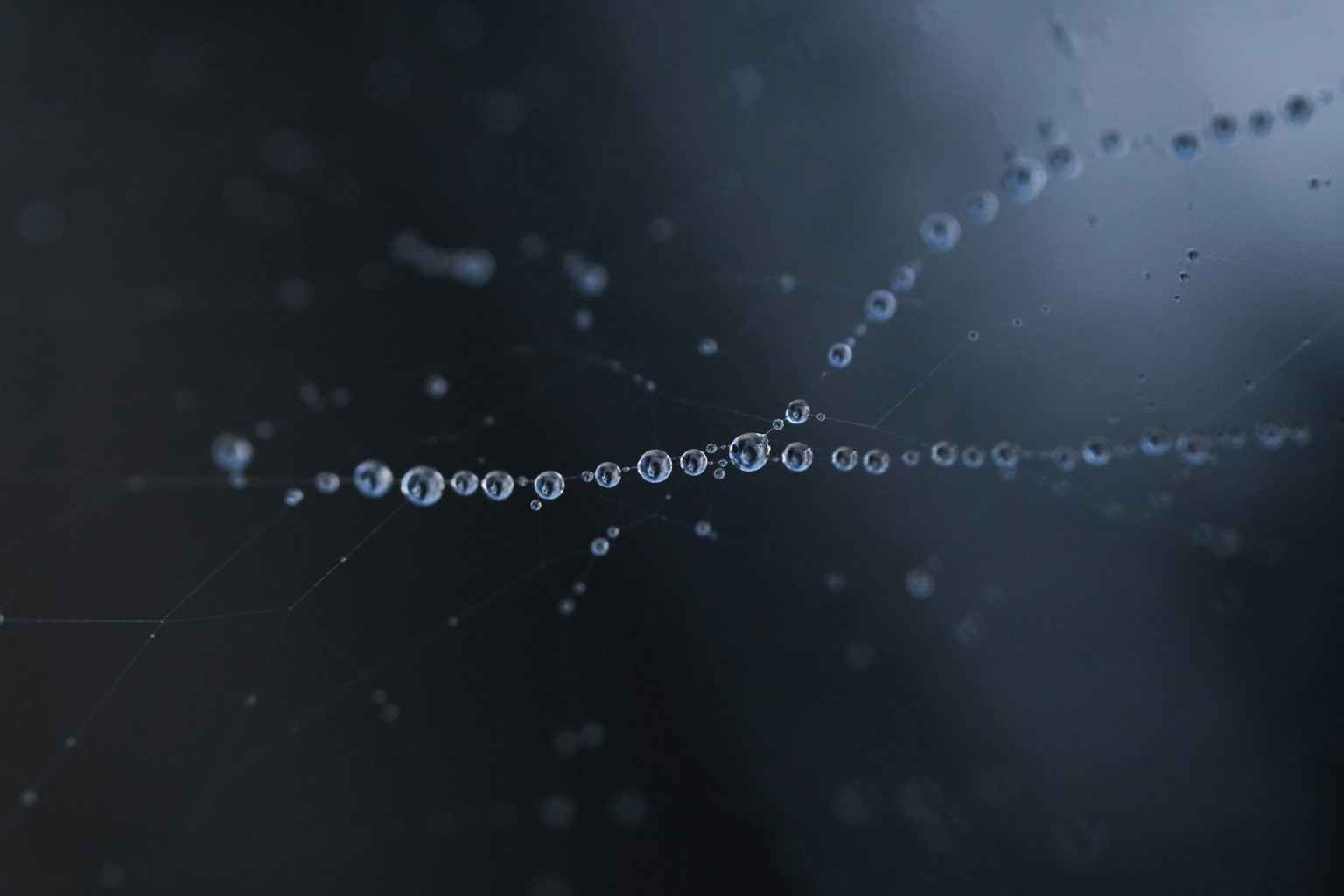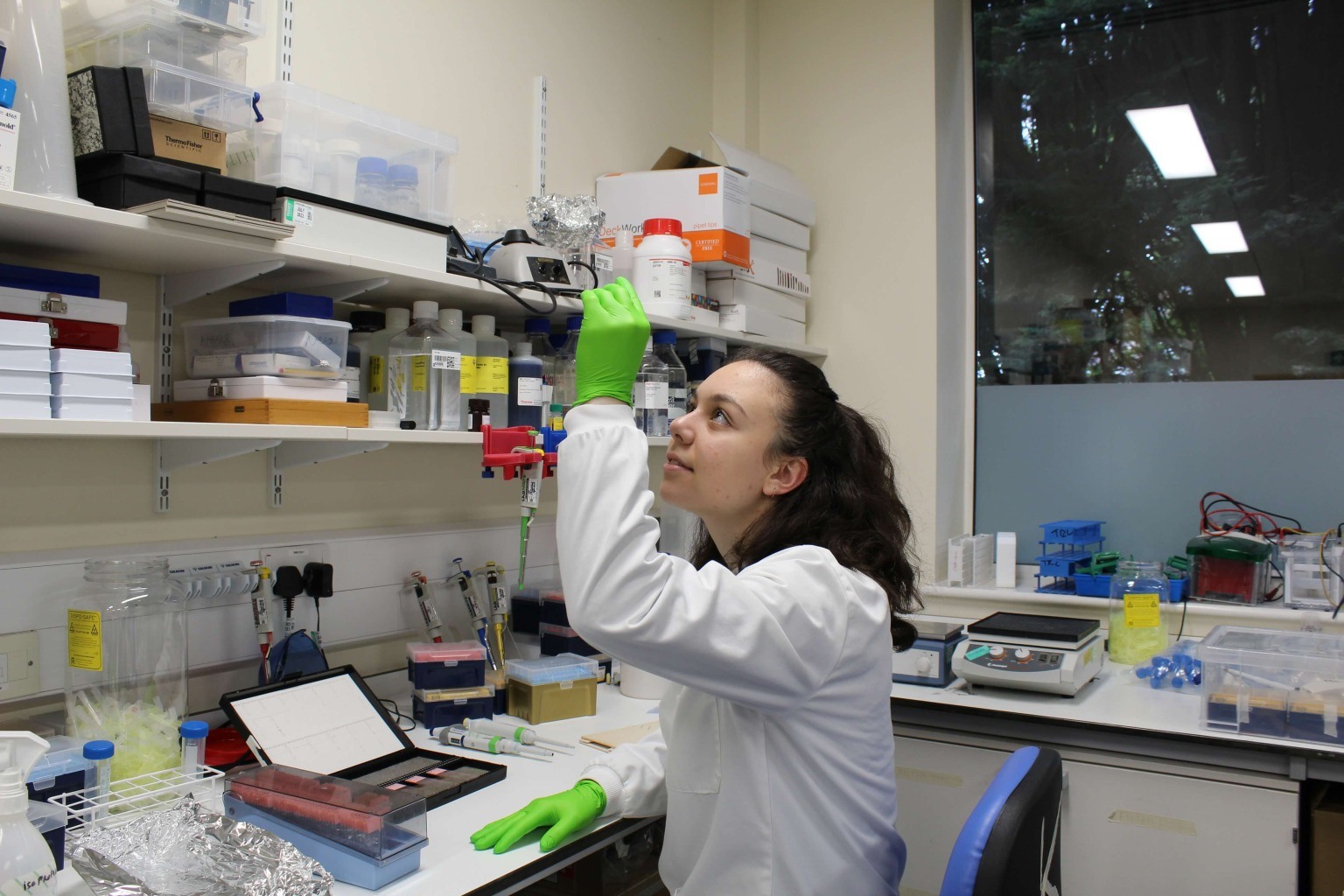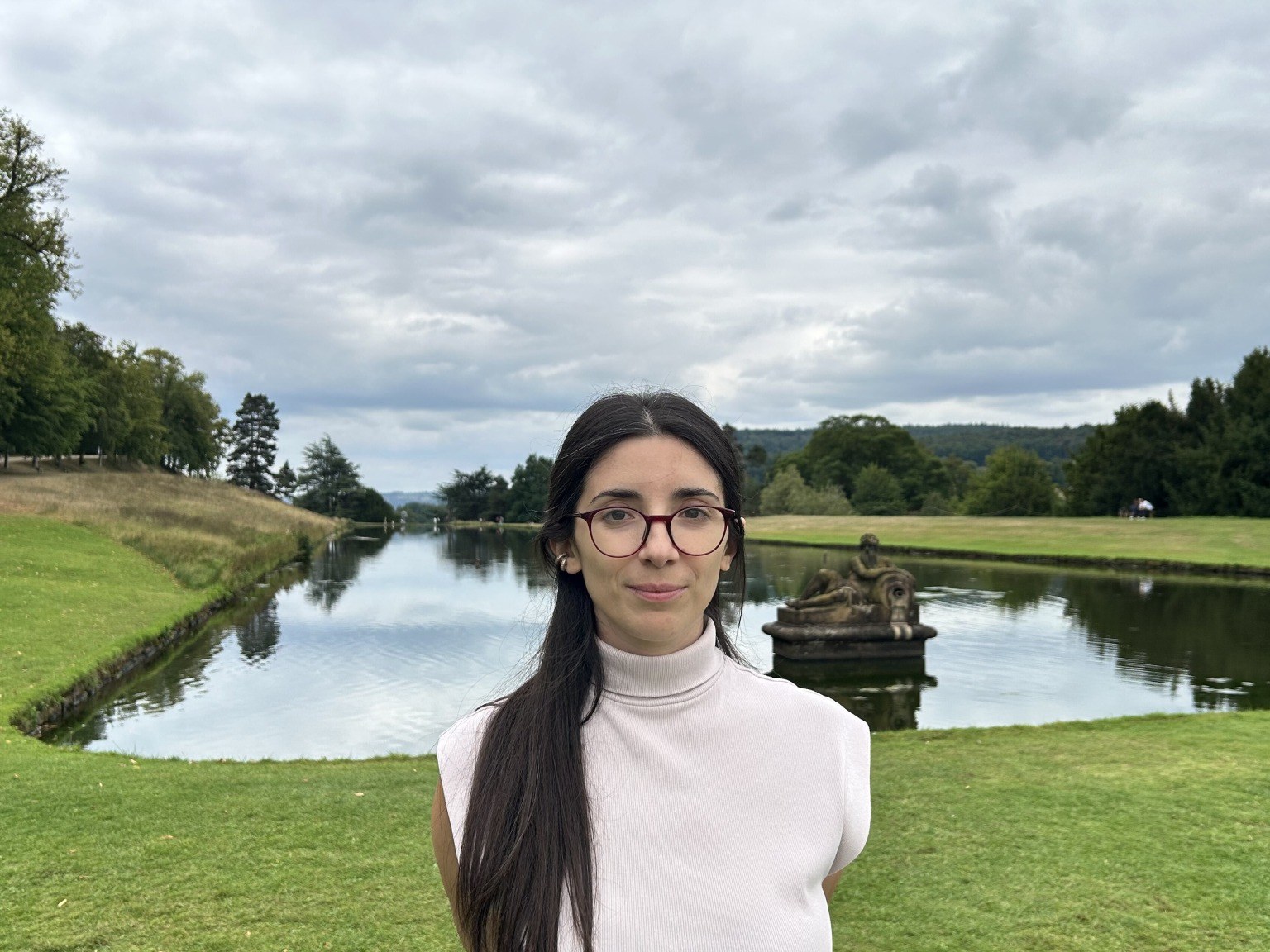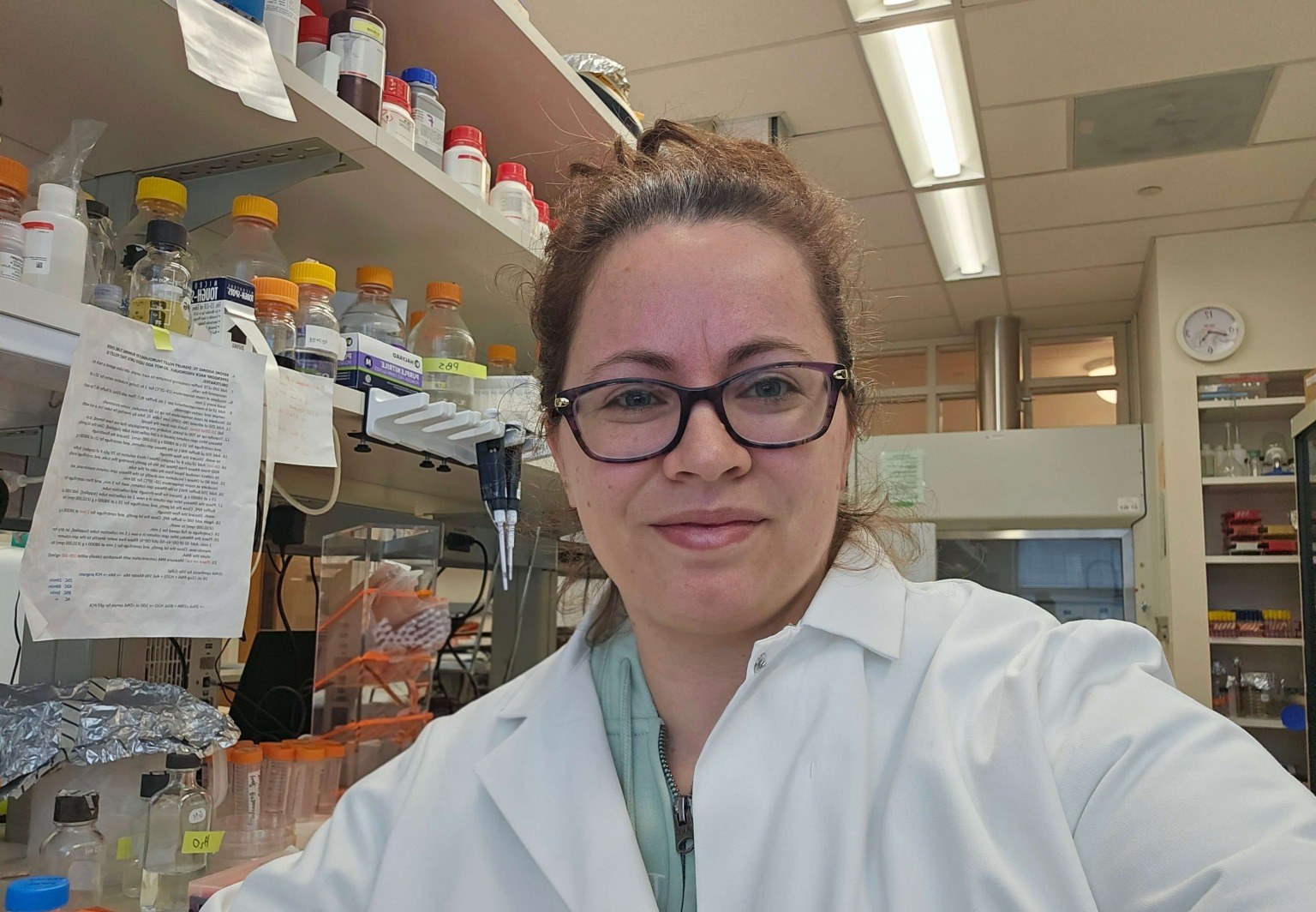
Exploring the invisible: Dr. Ariadni Boziki simulates the molecular world
Chrysovalantou Kalaitzidou

Magazine / Interviews , Science
Maria grew up in Athens and graduated from high school in 2018. In 2022, she completed her undergraduate studies in Biomedical Genetics at Newcastle University in the United Kingdom, graduating with Honors and the highest distinction in her cohort. She then pursued a Master’s by Research degree in Ageing, carrying out her studies at Newcastle University and conducting her dissertation research at the University of Oxford, being the first to bridge a collaboration of its kind between the two institutions.
Since then, she has been conducting research as a DPhil (PhD) researcher in Molecular and Cellular Medicine at the University of Oxford, fully funded with scholarships from the A. Onassis Foundation and Oriel College, Oxford. She is the third recipient of the Mellon Longevity Graduate Scholarship, which supports research on ageing with the aim of reducing frailty and the burden of age-related diseases.
Her research focuses on uncovering the biological mechanisms that deteriorate with age and lead to cellular damage, ultimately aiming to eliminate age-related diseases.
What inspired you to study Biomedical Genetics and specialize in Musculoskeletal Sciences and the Biology of Ageing? Was this always an interest of yours, or did it develop later during your studies?
From a young age, I was eager to understand why we develop diseases and, more importantly, how we could eliminate them. This innate curiosity guided me through my undergraduate studies, where I gradually shifted from curiosity to a deep commitment to discovery and research.
Selecting my undergraduate degree, however, was not straightforward. As I approached the decision to pursue higher education, I found myself facing personal uncertainty, thinking that medicine would be the only natural choice. Despite the search for completing studies abroad, this route was unknown to me, particularly since no one in my immediate circle had taken such a step before. Yet, with the immense support of my family, I embarked on that journey into the unknown.
Within this framework, I discovered genetics, a field that was entirely new to me at the time, in my 18. Genetics is the study that examines how our genetic material shapes our features, based on our hereditary background and the environment. For me, this was a really pioneering field with enormous prospects; a field that inspired me to delve deeper, and ultimately pursue it. This quest led me to Newcastle University, the only institution in the UK offering a course in Biomedical Genetics, delving into the complexity of the human genome and linking this knowledge, very uniquely, to human disease.
Throughout my studies, I realized that one common risk factor consistently emerged across all diseases: advanced age. Despite its recognized importance, the biological reasons behind ageing remained underexplored. This knowledge gap, coupled with the urgent need to improve the quality of life in older adults, inspired me to focus on ageing research.
Pursuing postgraduate and later doctoral studies was therefore a natural progression. I completed my MRes in Ageing and am now undertaking a DPhil investigating the underlying biological mechanisms that alter with age in the musculoskeletal system and contribute to diseases, such as osteoarthritis.
While medicine once seemed the only career path, biomedical research revealed to me another way to improve human health, working in the background - sometimes with nothing more than a pipette.
How did you decide to continue in academia? What led you to make this decision?
My passion for research and the curiosity nurtured during my undergraduate studies were the main drivers behind my decision to remain in academia. Over the years, I have had the privilege of working with inspiring professors, researchers, collaborators, and mentors, who further deepened my dedication to science.
Working in different research institutes over the past six years, I have had the chance to investigate and explore diseases that arise from advanced age and/or damage in the immune system, as well as genetic disorders. Each new research environment has been a unique learning journey.
Every scientific interaction I have had, revealed to me that even when we believe we know something, or that we have accomplished in explaining something, something new always emerges to explore. Biology always reminds us how little we actually know. And this is the uniqueness of our field. We believe we can explain biology, or at least we try; however, by reading, studying, and researching more, the limits of our knowledge are constantly revealed to us – how little we can explain and how much more we can investigate and surpass. The seemingly imperfect and unfinished nature of scientific research is where its beauty lies in the privilege of continuous learning and pushing the boundaries of knowledge.
The academic community is primarily the space where this process thrives. Where ideas meet, are synthesized, and transformed into action. For me, choosing an academic journey is the means that allows me to seek answers to questions that do not have easy solutions, and to contribute, in my own unique way, to improving human life. Thus, through my research, I manage to combine curiosity with purpose, and with my doctoral studies, I aim to push knowledge to its limits, and if I am fortunate and successful enough to achieve, even a little, to expand those limits.
What is your current role? What are the main tasks, and what does your day-to-day routine look like?
As a doctoral researcher, my role is fully research-based. My project focuses on osteoarthritis, a degenerative joint disease with no effective treatment that affects millions of older individuals worldwide. Specifically, my research aims to map the cellular mechanisms that deteriorate with age and lead to cartilage degradation and disease onset.
To study the scope of the scientific question I have posed, I organise my daily routine around experiments, aimed at assessing whether the data confirm or refute our initial predictions.
During my DPhil, I can structure my day with flexibility, given that I guide the direction of my research. At the same time, I work closely with other members of my research team and with the broader research community within the Institute I am based, to collaboratively contribute to the completion of any ongoing study.
Biology always reminds us how little we actually know. And this is the uniqueness of our field. The seemingly imperfect and unfinished nature of scientific research is where its beauty lies, in the privilege of continuous learning and pushing the boundaries of knowledge.
What skills did you acquire during your academic journey that were essential for your transition to your current role?
Dealing with failure was one of the biggest challenges and most important skills I acquired during my academic career. Experimental research is inevitably accompanied by failed experiments and unsuccessful attempts before it bears fruit and leads to a promising result. Through this process, I learned to approach setbacks with resilience, critical thinking, and persistence. Though this experience is often demanding, even to this day, it ultimately teaches you that progress usually emerges after multiple failures, and that success earned this way often holds a deeper, more special meaning.
I also learned the importance of sharing and discussing my concerns, which, to my surprise, showed me that very often these experiences are universal. This reminder helped me approach obstacles with greater calmness and less fear, especially by watching people who ultimately succeeded and using their experience as an inspiration.
Perhaps, the most defining skill I cultivated, however, was the ability to think “outside of the box”. I always sought to seize any opportunity presented to me, with dignity and respect, to achieve my goal. There were, however, several times when the opportunity did not exist. So, what I cultivated was how to approach the goal by creating the opportunity needed myself. It was something that helped me develop enough dynamism, decisiveness, and, if I may say so, audacity, elements that, along the way, helped me to navigate any environment I found myself in.
How do you envision yourself in the following years? What is your ideal career development plan?
In the years ahead, I envision myself continuing in the medical sector, contributing to research programs that aim to eliminate disease and improve the quality of life. While I cannot predict exactly where I will find myself professionally, I am certain that wherever my path leads me, my primary motivation will always be the pure intention to provide help and contribute to humanity, with the goal of creating a better world. These were, after all, the initial reasons that prompted me to follow this path and direction in life and career.
At the same time, having taken my first steps in the field of education and teaching, the promotion of knowledge is an equally possible professional route that I can envision myself in. Having been, and continuing to exist in a certain context, in the position of a student, I perceive teaching as a very powerful tool for guiding, inspiring, and developing students equipped with critical thinking. I believe it is crucial to provide future generations with the means to discover their talents, excel in what makes them happy, and develop a questioning and reflective mindset.
As for the ideal career path, I would like to create something of my own over time, something that will carry my personal stamp. While I do not yet know what form this will take, I am certain it will be grounded in knowledge, creativity, and my dedication to science. To build something from scratch and watch it grow is, for me, the most exciting prospect for the future.
How does your volunteer work in our organization contribute to your personal and professional development?
Joining Greek Women in STEM came at the right moment in my journey. I am part of the external relations team, where I help promote and communicate the organization’s activities through social media and increase its visibility.
Through this experience, I have been given the opportunity to actively increase the visibility and support of women in the field of science and technology. At the same time, I have the chance to work alongside talented women, pioneers from diverse backgrounds and fields, who constantly inspire me to contribute to the empowerment of the next generation of women in STEM.
Greek Women in STEM, and most importantly, the women behind it, have shown me the importance of empowerment, mentorship, and collaboration in science. This experience has been invaluable, both personally and professionally.
Get in touch with Maria through LinkedIn and her GWiS bio.

Chrysovalantou Kalaitzidou

Thaleia-Dimitra Doudali

Danai Korre

Katerina Britzolaki